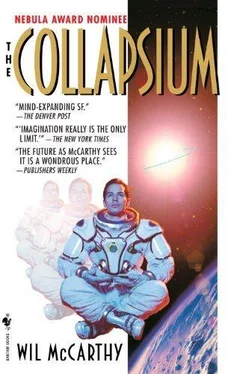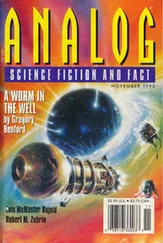And farther away still, where the ground started rising up into low, rounded hills, Bruno saw the inky blackness of su-perabsorbers. Solar energy conversion, nearly 100% efficient. He thought of his own little sun, imprisoned in converters and finally murdered outright, and he winced inwardly. Marlon had thought things through much better than Bruno ever had; he would not want for energy in this place.
The floor of the cylinder opened into a spiral staircase leading down into darkness.
“Come,” Shiao said without delay, leaping for the staircase and beckoning Bruno to follow. The gravity was light here— probably no more than half a gee. Shiao seemed to glide down the stairs like a man-shaped balloon, his feet only occasionally touching down. In moments, the shadows had swallowed him whole. Gulping, Bruno started after him, probably with a good deal less grace.
Had Bruno been a claustrophobic or acrophobic sort, these stairs would be a nightmare—each one just barely wide enough for his foot, the spiral itself just barely wide enough for his suited body, and without any sort of banister. As the first turn completed, the stairs above him closed over in a tight, low ceiling that was barely high enough to accommodate his helmet dome. His suit headlamps switched on; they were the only source of illumination, although far below it seemed he could see the dull reflections of Shiao’s lights. He clanked downward, metal toes on metal stairs, for what seemed like a long time: four turns, five, six…
Finally, at the eighth turn of the spiral, the stairs opened out into a chamber that Shiao’s headlamps—and now Bruno’s own—showed to be roughly the size of a di-clad worker’s platform. Ahead, the chamber was lined wall to wall with glossy black robots. They were short, long armed, long fingered. Some of them carried glossy black pistols of strange design; others were empty handed, but reached out those empty hands and made popping, blue-white electrical arcs across the spaces between them. There were twenty of the robots lined up across the room, and in fact, Bruno saw that in places they were two rows deep, and behind them all was a fax machine that, every few seconds, glowed and hummed and spat out a new comrade to join them. Rarely had Bruno— or anyone, really—seen a sight so menacing.
“Freeze! Royal Constabulary!” Shiao said in quick but officious tones. “This facility is a suspected crime scene. All autronic and telerobotic mechanical entities are ordered to shut down forthwith.”
Ignoring him, the robots, moving as a single entity, took a giant, clanking step forward.
That was all the encouragement Shiao needed—he raised his sword and pistol, uttered an uncharacteristically wild exclamation, and leaped directly at them. Pistols coughed—not only Shiao’s own but those of the robots as well. Shiao staggered. Bruno himself was knocked back by a series of impacts across his chest and arms. Bullets exploded in yellow-white pops, snapping miniature shrapnel into walls and floor and ceiling.
Shiao cried out again, not in pain but in a sort of battle mania. In one motion he straightened his body, aimed, and fired his pistol point-blank into the skull of the nearest robot. The robot, alas, neither staggered nor fell.
Breathing hard, too hard, Bruno realized he himself was essentially unhurt—these space suits were tough, bulletproof. His helmet dome was slightly chipped in two places, and the white outer fabric of the suit itself was discolored here and there. Unfortunately, the gleaming hulls of the robot guards appeared to be tougher still.
Undaunted, Shiao hefted his sword against the same attacker. That worked much better—the impervium blade, vibrating so rapidly its edges were a fog, sliced through the robot’s neck, decapitating it cleanly. But still the robot did not fall; still it reached for Shiao with long, bright-sparking hands. A dozen robots pressed around Shiao, clawing silently, mere moments from zapping him or crushing him or lifting him off the floor and doing Heaven knows what. Another six of the things were advancing on Bruno— clank, clank, clank . And he realized he had never—not once in his life—struck a blow in anger. He had never learned how.
The situation was, in a word, desperate.
But there was a rod of wellstone in Bruno’s hands, gripped tightly, held out before him at chest level, and with a few whispered commands he caused its surface—in the middle and on the ends, well away from his hands—to seethe with all manner of exotic fields and substances, all manner of EM radiation and software pathogens and electrochemical reactions. He had no idea what these enemies were made of, which of the thousands of improbably durable materials had been woven together to form these gleaming hulls, but he figured surely something would hurt them. Ditto their sensory and computational systems—no matter how rugged the design, in the end they had to be made of something, controlled by something, vulnerable to something in the wellstone’s vast library.
The robots advanced, and advanced some more. In another moment they’d be upon him…
“Back, you!” Bruno shouted at them. With more conviction than skill, he lashed out with the rod before the robots quite had a chance to lash out at him.
The results are, of course, known to all, as the blitterstaff has been a standard antiautomata weapon for hundreds of years. But recall that de Towaji had no history to fall back on; he invented the thing right there and then, with little time for a careful consideration of its properties. Try to imagine, then, his sense of stunned relief and triumph, when the advancing robots screamed and bled and melted at his touch! Six of them toppled immediately: masses of twitching, disorganized, heterogeneous matter that ruined the floor wherever they fell, warping and buckling it with blitter scars.
Six more robots advanced over the smoldering carcasses of their brethren. Six more fell. Some few of the victims retained, at least approximately, the shapes their creator had given them, but as for function , not one of them remained conscious or coherent for longer than a few milliseconds.
Cheng Shiao had meanwhile given a good account of himself, having completely dismembered three of the robots through a series of carefully aimed strikes. Their severed arms and legs, littering the deck around him, naturally fought on, but mindlessly, their distant heads and torsos unable to advise them.
But Shiao was sorely pressed, his spacesuit a mess of burns and gouges, his helmet dome spiderwebbed with cracks. Angry robots surrounded him three rings deep, and their bludgeoning claws struck at him again and again, with telling blows. He staggered, lurched, fought as madly and yet also as carefully as his skills and training permitted. But it wasn’t enough. His doom was certain.
Bruno, realizing the power of this thing he carried in his hands, had become a bit giddy with it all. He advanced on the robots, screaming and laughing in a voice that none would recognize, and dashed them one by one to oil-smeared flinders.
“Awayf Away!” he shouted, and while robots are incapable of fear, their controlling software does have some inkling of caution. Walking directly into a weapon, or holding still while one is wielded against them, is inefficient compared to a duck-and-roll attack or even a simple outflanking maneuver. So Shiao’s attackers, becoming aware of the blitterstaff in their midst, began to shrink back from it as though afraid. They would have dived for Bruno’s knees, surely, or ducked aside to get behind him, if he weren’t whirling the thing around him with such crazy abandon.
One by one, they slipped into its range and were destroyed, and with each fallen comrade, the panic of the others seemed to increase. Soon they were ignoring Shiao entirely, stumbling over each other in their press to escape. Bruno shouted his laughter over and over, all the bottled rage finding its outlet at last. Even Shiao cringed before him.
Читать дальше












